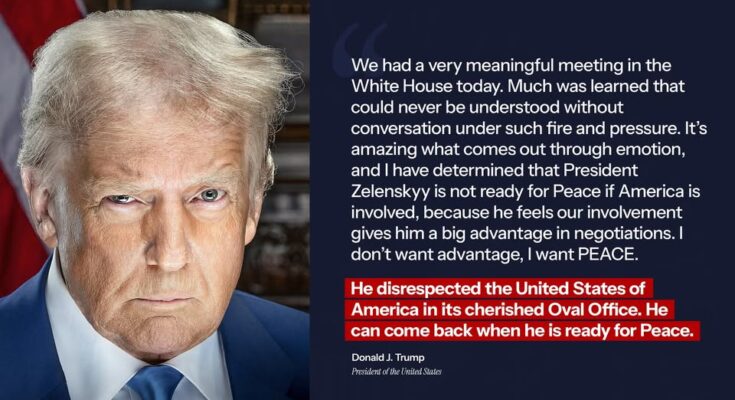In a striking and bold statement, former U.S. President Donald J. Trump declared, “He disrespected the United States of America in its cherished Oval Office. He can come back when he is ready for Peace.” This remark, seemingly directed at Ukrainian President Volodymyr Zelenskyy, has sparked intense discussion about the future of U.S.-Ukraine relations, the ongoing war with Russia, and America’s role in global diplomacy.
The Weight of the Oval Office
The Oval Office has long been regarded as a symbol of American leadership, diplomacy, and global influence. By stating that Zelenskyy “disrespected” it, Trump implies that the Ukrainian leader either conducted himself inappropriately during their meeting or took a stance that Trump viewed as uncooperative or overly demanding. Given that Zelenskyy has relied heavily on U.S. support for Ukraine’s defense against Russian aggression, this remark suggests a shift in Trump’s view on continued American involvement in the conflict.
Trump’s assertion that Zelenskyy can return only when he is “ready for peace” raises crucial questions: Does Trump believe Ukraine is unwilling to negotiate? Is he signaling a potential change in U.S. policy regarding the war? Or is this simply another example of his hardline negotiation style?
A Shift in U.S. Foreign Policy?
If Trump were to return to office, this statement suggests he might take a different approach to the Ukraine-Russia war compared to the current U.S. administration. While President Joe Biden has strongly supported Ukraine through military aid, financial backing, and diplomatic efforts, Trump’s comment implies that he sees prolonged U.S. involvement as unnecessary or even counterproductive.
His stance aligns with the America First doctrine he championed during his presidency, which prioritized U.S. interests over foreign entanglements. Trump has previously expressed skepticism over funding Ukraine’s defense without clearer pathways to negotiation, arguing that the U.S. should not bear the brunt of the war’s costs while European nations contribute less.
The Question of Peace
Trump’s statement suggests that peace should be the priority, but it also raises the question: On what terms? Ukraine has consistently stated that peace cannot come at the cost of territorial concessions to Russia, while Russian President Vladimir Putin has shown little willingness to negotiate without securing significant gains.
Would Trump push for peace talks at the cost of Ukraine ceding territory? Would he use his diplomatic style to broker a deal that Biden and other world leaders have failed to achieve? Or is this simply a warning that under his leadership, U.S. aid and involvement in the conflict would come with stricter conditions?
Conclusion: A Defining Statement for 2024?
Whether one sees Trump’s statement as a bold stand for diplomacy or a signal of potential U.S. disengagement, it is clear that his approach to foreign policy remains a defining aspect of his political brand. As the 2024 election looms, such remarks could shape both international relations and domestic debates on America’s role in global conflicts.
Only time will tell what this message truly means for Ukraine, Russia, and the future of U.S. leadership.



